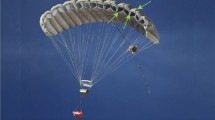Abstract
An increasing demand for the flight dynamics identification in studying parafoil system arises. In this paper, we explore the natural motion principle to investigate the parafoil flying based on structure configuration. A six degree of freedom parafoil model is established via aerodynamic equations. Consequently, simulations on the airdropping procedure is conducted. Given that the simulation outcomes cannot always match the practical trajectory precisely, an airdrop experiment is setup to verify the model as well as the simulating results, which is proven the superior of proposed model in both effectiveness and accuracy. The simulation focuses on the basic motions of gliding, turning, flare landing and the responses to mechanical parameters of the parafoil. The simulation results provide an opportunity for the regulation of parameters in parafoil trajectory control strategy.













Similar content being viewed by others
Explore related subjects
Discover the latest articles and news from researchers in related subjects, suggested using machine learning.References
Tan, P.-L., Sun, Q.-L., Jiang, Y.-X., Zhu, E.-L., Chen, Z.-Q., He, Y.-P.: Trajectory tracking of powered parafoil based on characteristic model based all-coefficient adaptive control. J. Central South Univ. 24, 1073–1081 (2017)
Luo, S., Sun, Q., Tao, J., Liang, W., Chen, Z.: Trajectory planning and gathering for multiple parafoil systems based on pseudo-spectral method. In: Proceedings of the 35th Chinese Control Conference, pp. 2253–2258 (2016)
Zhang, X.H., Zhu, E.L.: Design and simulation in the multiphase homing of parafoil system based on energy confinement. Aerosp. Control 29(2), 45–47 (2011)
Bennett, A.W.: Design of a precision airdrop system. In: AIAA-97-1469, pp. 169–176
Lacomini, C.S., Cerimele, C.J.: Longitudinal aerodynamics from a large scale parafoil test program. In: AIAA-99-1732, pp. 229–239
Stein, J.M., Madsen, C.M., Strahan, A.L.: An overview of the guided parafoil system derived from X-38 experience. AIAA 2005–1652, 1–14 (2005)
Ward, M.: Adaptive glide slope control for parafoil and payload aircraft. Doctor Dissertation, Atlanta, Georgia Institute of Technology (2012)
Desabrais, K.: The motion and aerodynamics of an airdrop platform. In: 22nd AIAA Applied Aerodynamics Conference and Exhibit, pp. 2004–4845 (2004)
Dimble, K.D.: Development of a Heading Correction Model for Parafoil-assisted Descent of a High-altitude Balloon System. University of Kansas, Lawrence (2007)
Goodrick, T.F.: Theoretical study of the longitudinal stability of high-performance gliding airdrop systems. In: 5th AIAA ADS Conference, p. 1394 (1975)
Slegers, N., Costello, M.: Model predictive control of a parafoil and payload system. In: AIAA, AIAA-2004-4822 (2004)
Doherr, K., Schiling, H.: 9 DOF-simulation of rotating parachute systems. In: AIAA, Proc. of the 11th AIAA Aerodynamic Decelerator Systems Technology (ADST) Conference, AIAA-1991-0877 (1991)
Hailiang, M., Zizeng, Q.: 9-DOF simulation of controllable parafoil system for gliding and stability. J. Natl. Univ. Def. Technol. 16(2), 49–54 (1994)
Gorman, C., Slegers, N.: Comparison and analysis of multi-body parafoil models with varying degrees of freedom. In: 21st AIAA Aerodynamic Decelerator Systems Technology Conference and Seminar, Dublin, Ireland, pp. 23–26 (2011)
Rademacher, B.J.: Inflight trajectory planning and guidance for autonomous parafoils. Doctor Dissertation, Iowa State University, Ames (2009)
Puranik, A.S.: Dynamic modeling, simulation and control design of a parafoil-payload system for ship launched aerial delivery system (SLADS). Doctor Dissertation, Michigan Technological University, Houghton (2011)
Jann, T.: Advanced features for autonomous parafoil guidance, navigation and control. In: 8th AIAA Aerodynamic Decelerator Systems Technology Conference and Seminar, AIAA-2005-1642 (2005)
Rong, H.: Homing trajectory planning and control for the accurate aerial delivery of parafoil system. Master Dissertation, Nanjing University of Aeronautics and Astronautics, Nanjing (2014)
Ward, M., Gavrilovski, A., Costello, M.: Glide slope control authority for parafoil canopies with variable incidence angle. J. Aircr. 5(50), 1504–1513 (2013)
Slegers, N., Beyer, E., Costello, M.: Use of variable incidence angle for glide slope control of autonomous parafoils. J. Guid. Control Dyn. 31(3), 585–596 (2008)
McGee, T.G., Spry, S., Hedrick, J.K.: Optimal path planning in a constant wind with a bounded turning rate. In: AIAA Paper 2005-6186 (2005)
McNeely, R., Iyer, R., Chandler, P.: Tour planning for an unmanned air vehicle under wind conditions. J. Guid. Control Dyn. 30(5), 1299–1306 (2007)
Liang, T.C., Liu, J.S., Hung, G.T., Chang, Y.Z.: Practical and flexible path planning for car-like mobile robot using maximal-curvature cubic spiral. Robot. Auton. Syst. 52, 312–335 (2005)
Prakash, A.N.: Modeling and simulation of 9-DOF parafoil-payload system flight dynamics. In: AIAA-2006-6130 (2006)
Goodrick, T.F.: Theoretical study of the longitudinal stability of high-performance sliding airdrop systems. In: 5th AIAA Aerodynamic Decelerator Systems Technology Conference and Seminar, AIAA-l975-l394 (1975)
Brown, G.J.: Parafoil steady turn response to control input. In: Aerospace Design Conference, AIAA-1993-1241 (1993)
Thomasson, P.G.: Equations of motion of a vehicle in a moving fluid. J. Aircr. 37(4), 630–639 (2000)
Barrows, T.M.: Apparent mass of parafoils with spanwise camber. J. Aircr. 39(3), 445–451 (2002)
Lissaman, P.B.S., Brown, G.J.: Apparent mass effects on parafoil dynamics. In: AIAA Paper 1993-1236 (1993)
Ward, D.T., Stragnac, T.W.: Introduction to Flight Test Engineering, 2nd edn. Kendal/Hunt Publishing Co., Dubuque (1998)
Acknowledgements
This research is a general project supported by Aeronautical Science Foundation of China (2011ZD10010).
Author information
Authors and Affiliations
Corresponding author
Rights and permissions
About this article
Cite this article
Zhang, Z., Zhao, Z. & Fu, Y. Dynamics analysis and simulation of six DOF parafoil system. Cluster Comput 22 (Suppl 5), 12669–12680 (2019). https://doi.org/10.1007/s10586-018-1720-3
Received:
Revised:
Accepted:
Published:
Issue Date:
DOI: https://doi.org/10.1007/s10586-018-1720-3




